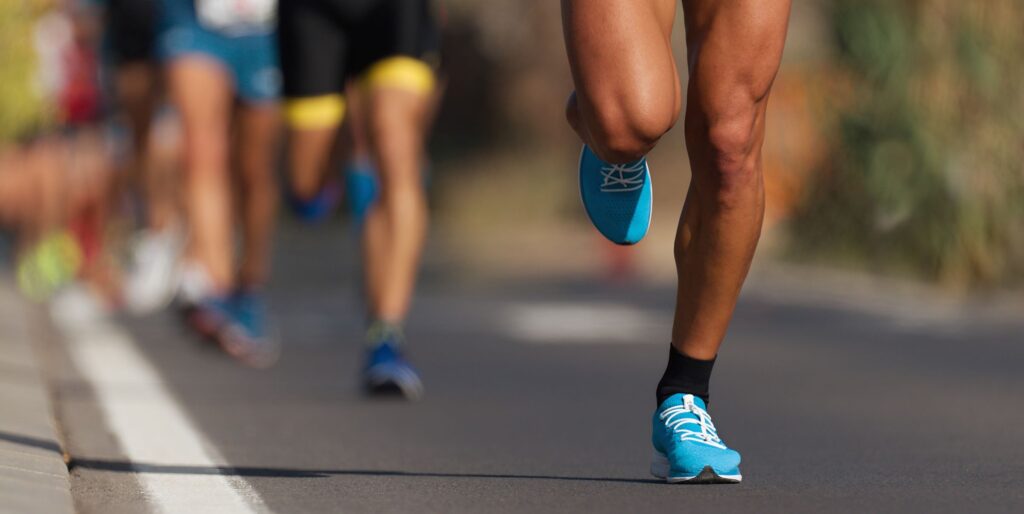
Does Running Cause Knee Osteoarthritis (OA): Myth or Fact?
You will often hear people say running is “wearing out their knees”. But is running really linked to knee osteoarthritis (OA)? There is an old belief that while we run, we are wearing out our cartilage in our knees and this will slowly cause osteoarthritis. This age-old belief has sparked debate and concerns among runners for decades. However, recent studies have debunked this myth, revealing that running may actually have a protective effect on the knees.
So, do we need to consider our running load to protect the future health of our knees? Does all running have the same effect on our knees? And if running is not linked to knee OA then what does cause arthritis? And what can we do to minimise our risk of developing knee OA?
In this article, we’ll explore the truth behind the link between running and knee OA, check what the research says about the impact of running load, and discuss effective ways to minimise knee pain while running.
Understanding Knee Osteoarthritis
Knee osteoarthritis is a degenerative joint disease that primarily affects individuals aged 45 and above. It leads to stiffness, pain, crepitus (cracking/clicking), and reduced joint function. Extensive research shows that conservative treatment with physiotherapy is the first option when treating knee OA. This will focus on a graded strength program and may also include mobility exercises, hands-on treatment for initial pain relief and increasing range of motion, and advice regarding activity modification to keep moving within your comfort limits. Research also shows that achieving and maintaining as healthy weight is important in managing knee OA.
This conservative treatment with physio and exercise is effective in the vast majority of knee OA cases. However, if this fails then surgical intervention may be required, including knee replacement surgery. But we need to remember that this should only be a last resort, it is rarely required, and the strength you gain while you trial conservative management is important in helping you recover faster and more fully in the rare cases where surgery is needed.
Dispelling the Myth: Running And Knee OA
Contrary to popular belief, recreational running does not cause knee OA; in fact, it can be protective! Studies have shown that running reduces the risk of developing knee OA and slows down its progression in individuals already affected by the condition. In a comprehensive National Runners and Walkers Health Study2, involving 89,000 runners including marathon participants, no causative effect of running on knee OA was found. Instead, the results showed a decreased risk of knee and hip OA, reduced need for total hip replacements, and improved bone mineral density2.
“It has been shown that runners are 50% less likely to require surgery due to OA than non-runners”
Timmins et al, American Journal of sports Med, 20162
The Impact of Total Running Load And Elite Running On Knee OA
While recreational running has proved to be beneficial and protective against knee OA, the same cannot be said for elite or professional runners. A study comparing elite runners, recreational runners, and non-runners found that the prevalence of knee OA was highest among the elite group, with a rate of 13.2%. In contrast, non-runners had a prevalence of 10.5%, while recreational runners boasted the lowest incidence of OA at 3.5%3. Therefore, it’s important to acknowledge that excessive running at elite levels may slightly increase the risk of OA compared to the general population. But recreational runners, which accounts for almost all of the runners world-wide, came out on top with the lowest rates of knee OA.
Previous Injuries And Knee OA Risk
Certain running-related injuries, if left untreated, can increase your chances of developing knee OA. Patellofemoral Pain Syndrome (PFPS), often just called “runner’s knee“, is a common running injury that increases the risk of knee OA. However, this does not mean that individuals experiencing PFPS should stop running! Rather, they should address underlying biomechanical issues causing PFPS to allow them to continue running without aggravating their pain.
It’s worth noting that injuries like ACL reconstructions and meniscal tears, which significantly increase the risk of knee OA, are more prevalent in contact sports such as soccer and rugby. They are not normally associated with running, except perhaps after a fall or twist, for example when trail running.
Identifying Knee OA Risk Factors
Several factors have been identified as strong contributors to knee OA. These include obesity, hypermobility (i.e. hyper-flexibility), female gender, family history, previous knee injuries (as above), and age. Being aware of these risk factors can help you take proactive steps to prevent or manage knee pain with running.
Takeaway Message: Run Safely With Confidence
As outlined above, current evidence overwhelmingly supports the notion that running does not cause knee OA. Recreational runners have the best odds of avoiding OA in the future, while professional or elite runners slightly increase their risk. The group with the highest chance of developing OA are more sedentary non-runners. It’s important to address injuries promptly and consider underlying risk factors.
So, running is not detrimental to your joints; in fact, it can be protective. By taking necessary precautions and getting any niggling injuries treated promptly, you can continue running with peace of mind, knowing that you are promoting the health and strength of your knees.
Been Diagnosed With Knee OA And Not Sure What To Do?
Whether you’re a runner or not, if you’ve been diagnosed with knee or hip OA then physio can help. Managing your symptoms as early as possible, increasing your strength using the correct exercise program, modifying your activity where necessary, and maintaining a healthy weight are very effective in most cases. Click here to read more about physio for knee and hip OA, or click below to contact us or book online to see one of our physios.

